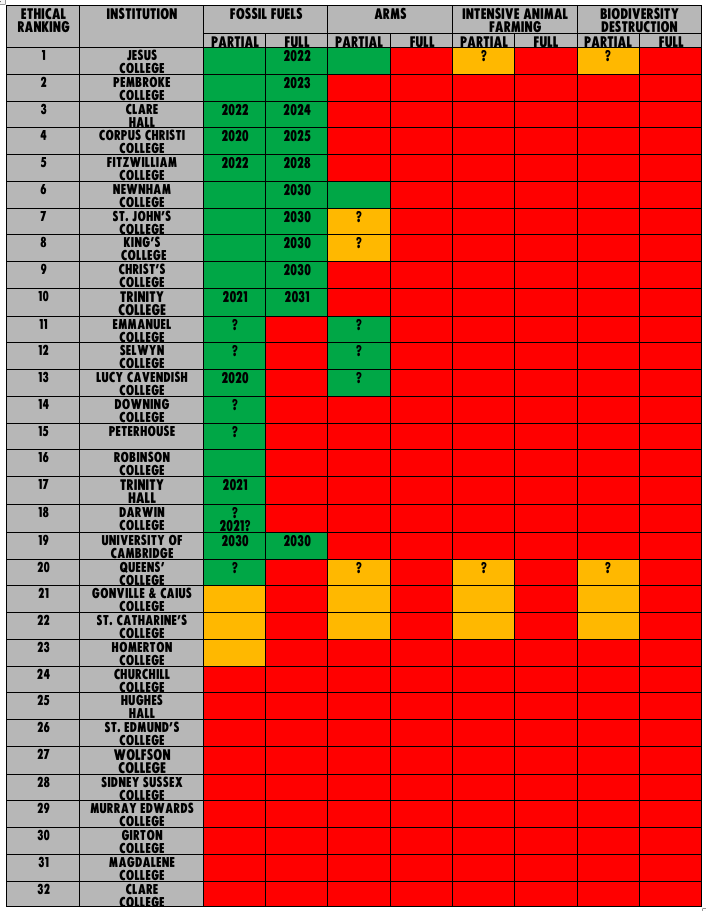It is time for the University and its colleges to listen to their constituent parts and the city and world they exist in. We demand, on behalf of both town and gown, that the University of Cambridge and its non-divested colleges divest their endowment funds immediately.
Navigation
- Our demands
- Key facts - divestment and the University
- Our divestment categories
- Divestment jargon explained
- Updating a college’s status
- How can I help?
Updates
- 10th July 2020 - divestment campaign launched
- 2nd August 2020 - University and all colleges miss divestment deadline
- 15th August 2020 - first signs of progress
- 1st October 2020 - University commits to fully divest by 2030; bars fossil fuels companies from new donations/funding policy; and releases divestment report to public
- 6th October 2020 - Christ's College votes to fully divest from fossil fuels
- 12th October 2020 - Lucy Cavendish College commits to partially divest
- 12th November 2020 - Trinity Hall commits to partially divest
- 18th February 2021 - Pembroke College commits to fully divest by 2023
- 22nd February 2021 - Trinity College commits to divest 95% of fossil fuel assets by 2021 and the rest by 2031
- 23rd March 2021 - Corpus Christi College commits to fully divest by 2025
- 27th March 2021 - Newnham College commits to fully divest by 2030
- 7th May 2021 - St. John's College commits to fully divest by 2030
- 7th June 2021 - King's College commits to fully divest by 2030
- 25th June 2021 - Jesus College commits to fully divest by 2022
- 27th October 2021 - Fitzwilliam college commits to fully divest by 2028
University and colleges divestment statuses
Worst picks
- Clare College - has one of the largest endowments and amounts still invested in fossil fuels
- Queens' College - led us and the public to believe that it had fully divested from fossil fuels when it has only partially divested. We had to find this out through a long, slow freedom of information request process
- The University of Cambridge - committed to divest... by 2030! 10 more years of ecocide and fossil fuel investment until then (at the time of writing).
Best picks
- Pembroke College - promised to fully divest from fossil fuels by 2023
- Clare Hall - promised to divest partially from fossil fuels by March 2022 and fully by March 2024
Full divestment ethical ranking
The public evidence used to arrive at this ranking can be found here. Other information has been received privately from some colleges.
Last updated: Friday 7th January 2022


Ethical ranking method
The ranking was calculated by sorting institutions by:
- Whether the divestment commitment is within the next five years (already-divested institutions rank more ethically)
- How strong the divestment is (i.e. is it full or partial?), with one full divestment outranking two partial divestments
- Whether the institution mislead the public on its divestment status
- Whether there is commitment to staying divested
- Number of categories divested from
- Whether divestment happened before we had to demand it (implying evidence of existing morals in private as well as public)
- Amount of money left to divest in any area (more money yet to be committed to divestment gives a less ethical ranking)
Have you got information to share with us?
If you have information you'd like to share confidentially or would like to dispute the position of a college, please get in touch at xryouthcambridge@protonmail.com
